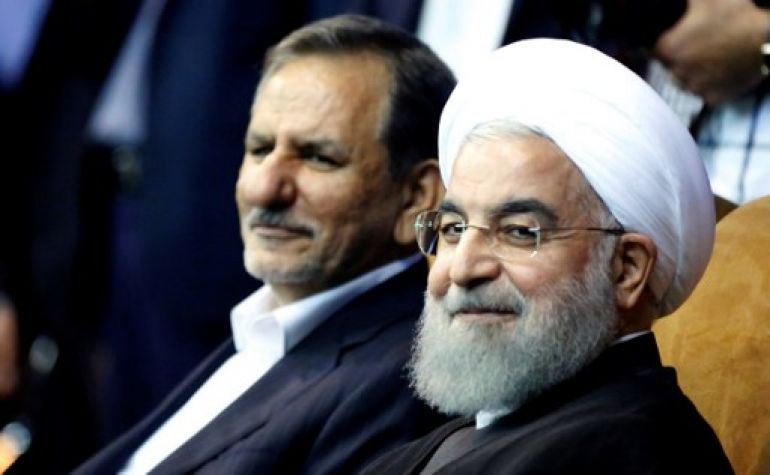UPDATE, 1500 GMT: First Vice President Es’haq Jahangiri has tried to assure Iranians that Tehran will be able to maintain its oil exports after comprehensive US sanctions on the energy and banking sectors are implemented on November 5.
European countries have informed Tehran that they will take steps before the sanctions to insure the Islamic Republic against any losses.
Jahangiri said some private companies, particularly Europeans, have left Iran, but argued that this has not been “very determining” about Tehran’s economic future.
In fact, major firms such as French energy giant Total, French and German automotive manufacturers PSA and Daimler, Germany’s Siemens, the world’s largest shipping firm Maersk, airlines Air France and KLM, French aircraft manufacturer Airbus, and Germany’s engineering and rail consortium Deutsche Bank have curbed or halted business.
Jahangiri said the European Union has given assurances to small and medium enterprises over threatened US punishment for maintaining links with Iran; however, he ignored that the EU faces difficulties with any guarantees to large companies.
Iran’s Rouhani Government, under pressure from hardliners, has appealed for “national unity” over the country’s economic difficulties.
First Vice President Es’haq Jahangiri said on Saturday that the Islamic Republic is facing “sensitive economic conditions, but maintained problems can be overcome: “No issue is more vital for the country than national unity, coherence, and understanding.”
He appealed for dialogue, as he maintained that the economy is not at a “dead end” and is not in a critical condition because of its “numerous and unique” capacities in natural and human resources.
The Government is facing long-term internal problems and expanding US sanctions, following Donald Trump’s withdrawal in May from the 2015 nuclear agreement. Production, trade, investment, and employment are facing obstacles; the currency has fallen by more than 60% since January; and inflation, which had been brought under control, is surging again.
Amid nationwide protests and hardline criticism which threatened the end of the Government, President Hassan Rouhani bought time last month with tougher rhetoric against the US — echoed by Jahangiri on Saturday as he said the Islamic Republic will “forcefully resist” the American “economic war”.
But last Monday, with no apparent respite in the currency crisis and economic difficulties, the Supreme Leader returned to pressure on Rouhani, shifting blame from the US to internal obstacles and the “imprudence and neglect” of Government officials.
On Friday, the Tehran Prayer Leader — working with guidance from the Supreme Leader’s office — repeated the commands to the Government, particularly over the banking and financial sector, and said the three branches of power — the Executive, the judiciary, and Parliament — must work together to deal with the difficulties.
See Iran Daily, August 14: Iranians Assess Supreme Leader’s Shift on Economic Crisis
Iran Daily, August 18: Tehran Friday Prayer Focuses on Internal Problems for Economy
Rouhani to Be Questioned Soon by Parliament?
An Iranian MP, Assadollah Abbasi, said on Saturday that President Rouhani will appear before the Majlis on August 28 to answer questions about the Government’s handling of the economy.
But the Vice President for Parliamentary Affairs, Hosseinali Amiri, said “no date has been agreed on”.
Some legislators have been seeking Rouhani’s first appearance for interrogation since he became President in 2013. Rouhani’s office have been holding out against any commitment in the near-future to an appearance.
Earlier this month, the Majlis dismissed the Labour Minister and hardliners, including clerics linked to the Supreme Leader, have been demanding the removal of other ministers with economic portfolios.
Security Forces Raid Home of Detained Lawyer Sotoudeh
Intelligence Ministry officers raided the house of detained human rights lawyer Nasrin Sotoudeh on Saturday.
Sotoudeh’s husband Reza Khandan confirmed the latest harassment:
It was eight o’clock in the morning when the security agents stormed into our apartment and ransacked it….
Our young children were asleep when three huge armed guys stormed into the place and searched every corner. Our children woke up and found these armed corpulent men over their beds. They were deeply shocked.
Agents also raided the house of Khandan’s sister.
Sotoudeh was a political prisoner from 2010 to 2013 over her defense of activists after the mass protests over the disputed 2009 Presidential election. She was re-arrested and taken to Evin Prison in June for representing two women who had protested over the compulsory wearing of hijab.
Last week security officers told Khandan that they had a warrant for a five-year prison sentence by a Revolutionary Court, but they did not present the verdict.
On Wednesday, Sotoudeh’s lawyers announced that their client had been told she had already been found guilty “in absentia” on spying charges.
“There is no evidence in her file for the charge of spying, no report by the intelligence ministry to explain how she is a spy,” Payam Derafshan said. But after a complaint was made to the judge, he added a charge related to her advocacy work against the death penalty.
Sotoudeh’s 2010 sentence was for 11 years, later reduced to six on appeal, with a 20-year ban on legal practice.
In 2012 the European Parliament awared the Sakharov Prize for Freedom of Thought to Sotoudeh for her defense of human rights.


The only national unity this government will create when the rest of the country unites to chase it out.